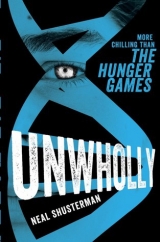
Текст книги "UnWholly"
Автор книги: Neal Shusterman
сообщить о нарушении
Текущая страница: 10 (всего у книги 27 страниц)
“No!” she shouts at him. “I will not allow you to take your own life! It’s not yours to take!”
She sits in a chair beside him, calming herself down. “If you won’t live for yourself,” she begs him, “then do it for me. Thrive for me. You’ve become my life, you know that, don’t you? If you die, you’ll be taking me with you.”
He won’t look her in the eye. “Unfair.”
Roberta sighs as Cam watches the relentless drip, drip, drip of the feeding tube that’s keeping him alive. He’s hungry. He’s been hungry for a long time, but it’s not enough to motivate him to eat. What’s the point in maintaining your life when it’s in question whether you’re even alive at all?
“I know the press conference was a mistake,” Roberta admits. “It was too soon—you weren’t ready—but I’ve been out there doing some pretty effective damage control. The next time you face the public, it will be different.”
Only now does he meet her eyes. “There won’t be a next time.”
Roberta smiles slightly. “Ah! So you can put together a coherent thought.”
Cam squirms and looks away again. “Of course I can. I just choose not to.”
She pats his hand, her eyes moist. “You’re a good boy, Cam. A sensitive boy. I will make sure we don’t forget that. I’ll also make sure you get whatever you want—whatever you need. No one will force you to do anything you don’t want to do.”
“I don’t want the public.”
“You will when it’s yours,” Roberta tells him. “When they’re trampling one another just to get a look at you. Not as some oddity, but as a star. A celebrated star. You need to show the world what I know you’re capable of.” She hesitates for a moment, preparing to tell him something. Perhaps something she’s afraid he’s not ready for. “I’ve been giving this a great deal of thought, and I believe what you need is someone to go out there with you. Someone who has completely accepted you and can draw the public’s curiosity in a more positive way. Dampen their judgment.”
He looks up at her, but she dismisses the idea before he can even propose it. “No, it can’t be me. I’m seen as your handler. That won’t do. What you need is a pretty little planet revolving around your star. . . .”
The idea intrigues him. It makes him realize that he hungers for more than mere sustenance. He hungers for connection. He’s seen no one his age since his creation. His age, he’s decided, is sixteen. No one can tell him any different. To have a companion—one who was born, not made—would bring him one step closer to being truly human. Roberta has calculated right this time. This gives him a fair measure of motivation. Once more he reaches for his IV line.
“Cam, don’t,” pleads Roberta. “Please, don’t.”
“Don’t worry.” He disconnects the IV and gets out of bed for the first time in weeks. His joints ache almost as badly as his seams. He walks to the window and peers out. He wasn’t even aware of the time of day until now. Dusk. The setting sun hides behind a cloud just above the horizon. The sea shimmers, and the sky is a brilliant canvas of color. Could Roberta be right? Could he have as much of a claim on this world as anyone else? Could he have more?
“Self-determination,” he decrees. “I will make decisions for myself now.”
“Of course, of course,” Roberta says. “And I’ll be here to advise you.”
“Advise, not order. Not control. I will choose what I do, and when I do it. And I will choose my own companion.”
Roberta nods. “Agreed.”
“Good. I’m hungry,” he tells her. “Have them bring me a steak.” Then he reconsiders. “No . . . have them bring me lobster.”
“Whatever makes you happy, Cam.” And Roberta hurries off to do his bidding.
18 • Risa
Risa is woken up in the middle of the night by the sound of feet pounding up AcMac’s ramp. She’s hoping this late-night visitor isn’t for her, but it always is. No one comes here in the middle of the night unless there’s some kind of medical emergency requiring her attention.
Kiana pulls back the curtain and barges in. “Risa, a couple of kids just got brought in. It’s bad, real bad.”
Kiana’s a sixteen-year-old who works the infirmary’s night shift, lives for drama, and always blows everything out of proportion. Having been purged from a family of doctors, she has a chip on her shoulder when it comes to proving what a good junior medic she is, so her exaggerations are usually just to make herself look better when she solves the emergency. The fact that Kiana has come to get Risa and isn’t trying to take all the glory herself means the situation must truly be serious.
“A couple of kids were messing with an engine turbine,” Kiana tells her, “and the whole engine came down. . . .”
Risa pulls herself out of bed and into her chair. “What were they doing messing with an engine turbine in the middle of the night?”
“I think it was some sort of dare.”
“Incredible.” Half the injuries Risa sees are either self-destructive or just plain stupid. She often wonders whether it’s just the nature of Whollies, or if it’s the same in the outside world.
When she arrives at the infirmary jet, every medic, both on and off duty, is already there. While a couple are older teens who stayed behind when they reached seventeen, the rest are just kids who have been trained to treat minor injuries, nothing more. The sight of blood doesn’t scare Risa anymore. What scares her are her own limitations—and from the moment she rolls in, she knows she’s way out of her depth.
In the corner one kid grimaces and groans with an obviously dislocated shoulder—but he’s getting only minimal attention, because the kid on the table is much worse off. His side has a huge, jagged wound through which Risa can see at least one protruding rib. He quivers and moans. Several kids frantically try to stem the bleeding, applying pressure to key arteries, and one kid with shaking hands tries to fill a syringe.
“Lidocaine or epinephrine?” Risa asks.
“Lidocaine?” he says, like it’s a question.
“I’ll administer. There are epinephrine injectors already prepared.”
He looks at her like he got caught in the school hallway without a pass.
“Adrenaline!” she says. “It’s the same as adrenaline.”
“Right! I know where those are!”
Risa tries to focus in, not allowing herself to be overwhelmed by the larger picture, and gives the injured boy the first shot, which will ease the pain.
“Did anyone call the doctor?” Risa asks.
“Like three times,” says Kiana.
There’s a doctor who comes out to the Graveyard when they have something on their hands they can’t handle. He does it free of charge, no questions asked, since he’s sympathetic to the resistance; however, he takes their calls only when he wants to. Even if they’re able to reach him, however, Risa knows what he’ll say.
“We have to get him to a hospital.”
Once she says it, all the kids there are visibly relieved, because now this boy’s life will not be in their hands. With all the injuries at the Graveyard, only twice before have they had to send a kid to a hospital. Both times the injured kid died. Risa is determined that it will not happen again.
“Hurts bad,” the kid says, between gasps and grimaces.
“Shh,” says Risa, and she sees his eyeballs begin to roll. “Stay focused on me.” She gives him the epinephrine shot, which should slow his bleeding and hopefully keep him from going into shock. “Tell me your name.”
“Dylan,” he says. “Dylan Ward.”
“Really? I was a ward too. Ohio State Home Twenty-Three.”
“Florida Magnolia. Florida state homes don’t got numbers. They’re named after flowers.”
“Figures.”
Dylan Ward is thirteen, maybe fourteen. He has a bad cleft lip, and looking at it makes her angry, because like her, he was a ward of the state—and while parents won’t unwind a kid on his looks alone, the state homes have no problem unwinding kids they don’t want to look at. For Risa, saving him now is a matter of honor. She tells Kiana to get the ambulance.
“It has a flat,” Kiana tells her.
Risa growls in frustration. “Fix it!”
“Don’t leave,” Dylan says, putting all his trust in her.
“I won’t,” she reassures him.
The ADR keeps promising to permanently station a doctor at the Graveyard, but that has yet to happen. She knows the resistance has other priorities, but when a kid is bleeding out, it’s a pretty lame excuse.
“Am I gonna die?” Dylan asks.
“Of course not,” she tells him. In truth, Risa has no idea whether he’ll live or die, but that’s not very comforting to hear, and no one wants the truth when they ask that question.
Risa rolls her way over whatever debris is on the floor and down the plane’s rear ramp, where a bunch of kids have gathered to fret.
One kid comes forward. It’s Starkey. Ever since Connor put him in charge of food service, he thinks his nose belongs in everything. “Is there anything I can do?”
“Not unless you have powers of teleportation and can get us to a hospital.”
“Sorry,” he says, “my tricks are just tricks.”
That’s when Connor runs up.
“I heard about the accident. Is everyone okay?”
Risa shakes her head. “One kid we can take care of, but the other”—again a shiver of memory—“has to go to a hospital.”
Connor’s lips go thin, and his legs start to shake like they did back when he was in the safe houses. He stops his fear response by pounding his fist into his hand, and he nods. “Okay,” he says, “okay, we’ll do what has to be done.” Only then does he seem to notice that Starkey’s there. “Is Starkey helping you?”
“Not really,” says Risa. Then, just to get rid of him, she says, “He can help fix the flat on the ambulance.”
Starkey looks insulted for a moment, then smiles. “Right, no problem.” And he trots off.
The ambulance is a seatless minivan, jury-rigged with medical equipment. Dylan is rushed down the stairs and loaded inside. One of the other medics will drive, and Kiana will tend to Dylan in the back. The boy calls for Risa, but she can’t get in with him. Once more she silently curses her wheels.
Starkey still lingers. He turns to Connor. “You mean you’re not going?” Starkey asks.
“The Admiral never left the Graveyard until he was carried out,” Connor tells him. “I lead by his example.”
Starkey shrugs. “It makes you look like a coward.”
Connor throws a quick glare at him.
“Hey, I’m just saying.”
“I don’t care what it looks like,” Connor says forcefully. “I do what I have to keep this place alive.”
“Sorry, I mean no disrespect, I guess I just have a lot to learn about being in charge.”
Starkey nods respectfully to Risa and leaves, but what he said sticks in her mind like gum on her shoe—or at least how it used to get on her shoe when her feet actually touched the ground. Connor is right, of course. If he went to the hospital, it would be a foolhardy show of bravado—the sign of an arrogant leader, not a responsible one. But Risa, on the other hand, has nothing holding her back but her wheelchair. And when has she ever let that stop her?
“I’m going this time,” she tells Connor.
Connor throws up his hands. “Risa, no one expects you to go. No one is going to think you’re a coward if you don’t.” He looks over at the minivan. “And getting you there, it’s too much—”
“Too much of a burden?” Risa finishes.
“I was going to say too much effort when every second counts for this kid.”
But her mind is set. “After what happened the other times,” she tells him, “I have to go.”
“It won’t change the outcome either way,” Connor points out.
“I know,” she tells him, even though she’s not entirely sure he’s right. He backs away as two of the medics lift her chair into the van.
“Even if they catch me, they can’t unwind me,” she reminds him. “I’m seventeen. And besides, the disabled can’t be unwound.”
“What if they recognize you?”
“Oh, please,” Risa says. “It’s our names that people know, much more than our faces. I’ll be fine.” Then she offers him a slim but sincere smile, and he reluctantly returns it. It doesn’t bridge the gap between them, but at least it marks the spot where the bridge might be built. She closes the van’s back door without saying good-bye, because they share a secret superstition, never saying good-bye to each other. Risa will soon regret that she didn’t.
• • •
It’s a bumpy ride out of the Graveyard with no paved roads, just the hardpan desert flattened by the wheels of jets. There’s more than a mile to the gate. In the back, Dylan moans with every bump. As they approach, the guards on duty, notified of the emergency, quickly open the gate.
Once they’re on paved roads, the ride is easier, and Dylan quiets down. Risa comforts him and monitors his vital signs.
The first time they had to bring a kid to the hospital, Kiana went with one of the other medics—a kid who panicked whenever Band-Aids didn’t stick—but he was the only other medically-experienced kid willing to venture out of the Graveyard on what was potentially a suicide mission. That first time, a new arrival had climbed to the tail of a cargo jet on a dare. He fell and cracked his skull. Risa would have gone, but everyone convinced her there was no point and it was too impractical. Kiana and the nervous medic had taken the boy to the hospital with a whole fake story of what happened and documents to back up a fake identity. The boy died in the hospital. The second time it was a girl with a burst appendix. Again the girl was rushed to the hospital, again Risa stayed behind, and again the girl died.
Risa doesn’t know what her presence at the hospital can do. All she knows is that she can’t sit back and wait to hear about another kid’s death.
• • •
Kiana helps Risa out of the back, then single-handedly carries Dylan into the ER waiting room, with Risa rolling in behind her. Now Risa must display her acting skills. She thinks about her friends in the band who had been playing in the Chop Shop when it blew—the ones who died—and the memory brings necessary tears to her eyes. Then she dredges up a character that saved her once before: the ditzy girl who talks in questions.
“Hello, can somebody help us? My brother was on the roof fixing tiles? And he fell from the roof and got hurt real bad? And we didn’t know what to do? So we brought him here, but there’s a lot of blood and we’re really scared? Can you help us?”
She hopes the tears plus the ditz can scramble anyone’s BS detectors as effectively as Hush Puppy once scrambled radar. There are rumors that the Juvies have started using DNA decoders in the field. She can only hope that they haven’t trickled down to hospitals yet.
Emergency room staff drop whatever they’re doing and rush to their aid. In a second Dylan’s on a gurney, being wheeled through the AUTHORIZED PERSONNEL ONLY doors.
“Is he going to be okay?” asks Risa, in panic that’s only partially feigned. “Because our parents are out of town? And we didn’t know what to do?”
“We’ll take care of him, honey,” says a nurse in a comforting tone. “Don’t you worry.” The nurse glances at Kiana, who has Dylan’s blood on her clothes, then heads off into the emergency room.
The doors swing closed, and Risa rolls over to the admissions desk, with a carefully planned wallet of false information, organized to appear disorganized, and intentionally designed to make Risa appear helpless and flustered.
“We’ll sort this all out later,” the admissions clerk says, giving up and getting on to the next person in line.
• • •
An hour of waiting with no word. Kiana’s been pacing, no matter how much Risa tells her to calm down, but perhaps being nervous just plays into their cover story. Finally the same nurse comes out into the waiting room. The woman is slightly teary-eyed, and Risa feels a pit in her stomach, as if Dylan, who she didn’t know before today, really is her brother.
“Honey, I’m afraid the news isn’t good. You’re going to have to prepare yourself.”
Risa grips the wheels of her chair, feeling a well of emotion beginning to bubble from deep inside her. Kiana puts her head in her hands.
“I’m sorry,” the nurse says, “but your brother was just too badly injured. We did everything we could. . . .”
Risa just looks at her in disbelief and shock. The nurse puts her hand on Risa’s, patting it gently. “I can’t imagine what you must be feeling right now, but we’re going to have to notify your parents. We’ve been trying, but no one picks up at the numbers you gave us. Do you have any other way of contacting them?”
Risa, her hair dangling in front of her face, shakes her head.
“Well then,” says the nurse, “we’ll have to keep trying. In the meantime, if there’s anyone else you can call . . .”
“Can you give us a few moments?” Risa asks quietly.
“Of course, dear.” The nurse squeezes her hand reassuringly and goes back through the emergency room doors, where Dylan’s body waits to be claimed by parents that don’t exist. Risa wipes her tears away, trying to find comfort in the fact that she did the best that she could.
And then Kiana says, “It’s just like the other times.”
That makes Risa look up, and something occurs to her. She wonders how similar it is.
“Kiana . . . you do know we’re supposed to go to a different hospital each time, right?”
By the look on Kiana’s face, Risa can tell she never learned that particular protocol. “Shouldn’t it be the closest hospital in an emergency?” Kiana asks.
The sudden dread that Risa feels is balanced with an equal amount of hope. “The other times you were here, did you see that same nurse?”
“I think so. At least once. That’s bad, isn’t it?”
“Yes and no. I’ll be back.”
Risa rolls herself toward the AUTHORIZED PERSONNEL doors and pushes her way through. She finds herself in a hallway that’s more starkly lit and even less inviting than the waiting room.
While hundreds of people flow through an emergency room, there aren’t many teenage kids with parents who mysteriously can’t be reached, and whose “siblings” vanish upon pronouncement of death. This nurse must have recognized Kiana—there is no question in Risa’s mind. Which means there’s more than one level of deception here.
“Excuse me,” someone says from farther down the hall, “you’re not supposed to be in here.”
But Risa doesn’t care. She rolls into a large room marked RECOVERY. It’s subdivided by curtains into cubicles with hospital beds, and she begins to pull back each curtain one by one. An empty bed. An old woman. Another empty bed, and finally, Dylan Ward. His wound has been dressed; an IV leads into his arm. He’s unconscious, but a monitor shows a steady heartbeat. He’s anything but dead.
Just then the nurse comes up behind Risa and turns her chair around. The woman is nowhere near as teary-eyed as before.
“You need to leave right now, or I’ll call security.”
Risa locks the brake, so the chair can’t be wheeled away. “You told me he was dead!”
“And you told me he was your brother.”
“We’re taking him and leaving,” Risa says, with authority enough in her voice to make it stick if she had any leverage whatsoever. Unfortunately, she doesn’t.
“He’s in no condition to travel—and even if he was, I would never turn an AWOL Unwind over to anyone but the Juvenile Authority.”
“Is that what you did with the others? Gave them to the Juvey-cops?”
“That’s my business,” the nurse tells her, as cold as can be.
“At least give me the courtesy of knowing if the other two are still alive.”
The nurse looks at her hatefully, then says, “They’re alive. But probably in a divided state by now.”
Risa wishes she could get out of her wheelchair and slam this woman into the wall. Burning gazes fry the air between them like microwaves.
“You think I don’t know what goes on down there at the Graveyard? I know; my brother’s a Juvey-cop. It’s a wonder they don’t round you all up and send you off where you belong!” And she points off, as if knowing the exact direction of the nearest harvest camp. “People out there are dying for lack of parts, but you and your selfish friends in the resistance would rather let good people die.”
So here it is, thinks Risa. The rift between two completely different versions of right and wrong. This woman sees Risa as a filthy outlaw, and nothing will ever change that.
“Are you really doing this to help society,” Risa snaps, “or is it for the reward money?”
The woman breaks her gaze, and Risa knows the truth. The woman’s moral high ground has split beneath her, and she’s fallen into the chasm.
“You go back and tend to your dirty horde,” the nurse says. “Do that and I’ll pretend you were never here.”
But Risa can’t go. She can’t leave Dylan to be unwound.
Just then a Juvey-cop comes into the emergency room.
“Over here,” calls the nurse, and looks back to Risa. “Leave now, and I’ll let you and your friend in the waiting room go. Maybe you can’t be unwound, but you most certainly can be locked up.”
But Risa is not going anywhere.
The nurse greets the cop, who by his looks is very obviously her older brother. He spares a long, curious glance at Risa before looking at the boy in the bed.
“This him?” he asks.
“We’ve stabilized him, but he’s lost a lot of blood. He won’t be ready for transport for a while.”
“Keep him sedated,” says the cop. “Best that he doesn’t wake up until he’s at the harvest camp.”
Risa grips her chair, knowing what she’s going to do at least ten seconds before she does it. Ten seconds of silent personal terror, but no indecision whatsoever.
“Take me,” she says. “Take me instead.”
She knows Connor won’t approve. She knows he’ll be furious, but she can’t muddy her resolve with thoughts of him now. This is about saving Dylan Ward.
The cop studies her—clearly he knows exactly who she is and exactly what her offer means.
“From my understanding, you’re seventeen, Miss Ward, and seeing that you’re in a wheelchair, we couldn’t unwind you anyway. So what possible value do you have?”
She smiles, finally having the upper hand. “Are you kidding me? A notorious member of the Anti-Divisional Resistance who knows exactly what happened at Happy Jack that day?”
He takes a moment to consider her point. “I’m not an idiot,” he says. “You’ll never cooperate. You’d rather die than cooperate.”
“Perhaps,” admits Risa, “but why should that matter to you? No matter how uncooperative I am, you’ll still get credit for bringing me in, won’t you?”
She can practically hear his mind clicking and whirring. “What’s going to stop me from capturing both you and the kid in the bed?”
“If you try,” Risa says calmly, “then you lose the prize. I have a subcutaneous cyanide pill in my palm.” She holds out her hand for him to see. “It’s right under the skin. All I have to do is bring my hands together to crack it open.” Then she mimes a wide clap, stopping just short of her palms touching. “You see,” she says with a grin, “there’s more than one type of clapper.”
There is, of course, no such pill under her skin, but he doesn’t have to know that. Even if he suspects she’s bluffing, he’s not sure enough to risk it.
“If I die right here, right now,” Risa says, “you won’t be known as the cop who brought me in, but the cop who let me die while in your custody.” Then she smiles again. “That’s almost as bad as getting shot in the leg with one’s own tranq pistol, isn’t it?”
The man frowns at the thought of being associated in any way with that other unfortunate Juvey-cop.
The nurse is not happy with any of this. She crosses her arms. “What about my reward money?” she asks.
Then her brother turns to her like an older brother should and says, “Shut it, Eva, all right? Just shut it.”
And with that, the deal is done.
Dylan’s chart will remain marked with his bogus records, and when he’s fit to travel, he’ll be released to Kiana, no questions asked.
But as for Risa, her life now lies on a different path.








